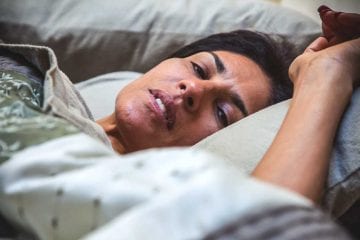Over the last 30 to 40 years the number of hours people sleep per night has dropped. And the numbers worldwide indicate that insufficient sleep is linked to negative social situations and serious health conditions. In fact, insufficient sleep is associated with seven of the 15 leading causes of death. Current information reveals that sleep plays a huge role in both workplace productivity and cognitive performance.
There is a lot of research to determine the public health impact and the macroeconomic costs of the insufficient sleep syndrome (ISS). On top of that, there is a need for models that highlight the importance of health issues and policies that will address the ISS. Sleep insufficiency has already been deemed a public health epidemic, which is why it should be considered a potential noncommunicable disease.
Table of Contents
What is the insufficient sleep syndrome?
Though it is considered a voluntary sleep disorder, it’s often an unpremeditated one. It boils down to sufferers not realizing that the symptoms of their sleep deprivation are the result of their own actions, and not precipitated by outer forces or other sleep disorders.
Today’s society is getting 25% less sleep than their ancestors did only a century ago. And no evidence can be given to support our need for less sleep compared to the generations before. There is also no indication that the prior generations needed more sleep. This trend of less sleep is simply the result of a busier lifestyle than was at the start of the 20th century.
Think about all the things people tend to need to do - commitments at home, work, school, after-school responsibilities, child-raising, sports, entertainment, and socializing.
The problem is that 24 hours in a day are not enough to get everything done and fit sleep in too! People sacrifice their sleep for everything else they have to or want to do. While it would seem that two or three hours less sleep each week (or night) wouldn’t be that big of a deal, it really is. In fact, it’s the beginning of a sleep disorder.
The insufficient sleep syndrome has many names – chronic insufficient sleep, sleep reduction, sleep deprivation, inadequate sleep, sleep restriction, and voluntary sleep curtailment. Whatever you call it, it’s not something you should do for your health and sanity.
The disorder was first classed in 1979 as a clinical syndrome and listed in the Diagnostic Classification of Sleep and Arousal Disorders. More than 100 years ago several sleep deprivation studies were done to understand how sleep functions. Since then other studies have shown what happens neurologically and cognitively - such as our judgement, mood, and reaction time - from being awake for too long.
It wasn’t until 1983 that the first few sets of patients had been diagnosed with ISS.
Before diagnosis they presented complaints of excessive daytime sleepiness, but had no other signs of idiopathic hypersomnolence, narcolepsy, mood disorders, etc. In the International Classification of Sleep Disorders (ICSD-3) ISS was listed under ‘Hypersomnias of Central Origin’. The diagnostic criteria for idiopathic hypersomnia include no overall improvement in sleepiness even after getting more sleep at night.
The symptoms of the ISS
The insufficient sleep syndrome is classed under the category of Central Disorders of Hypersomnolence in the International Classification of Sleep Disorders (third edition). Other recognized sleep disorders in this category include the Kleine-Levin Syndrome, idiopathic hypersomnia, and narcolepsy.
Each disorder has one primary complaint – daytime sleepiness that’s not the result of disturbed nocturnal sleep or abnormal circadian rhythms. People who suffer from the ISS will complain about:
- muscle pain and weakness
- irritability
- easy distractibility
- decrease in alertness
- general lack of energy
- daytime cognitive issues (inability to remember, poor concentration, etc.)
- falling asleep while partaking in activities such as watching TV, reading, driving, etc.
- excessive daytime sleepiness
- no medication, medical or mental problems, nor other sleep disorders to cause the symptoms
- patient sleeps less than they would for their age for at least three months.
The cause of insufficient sleep
Since sleeping for short amounts of time regularly may be tied to morbidity, it’s important that the risk factors for habitual short sleep be recognized and interventions be made to increase one’s sleep duration. The Institute of Medicine report in 2006 emphasized that it is not possible to recognize all the contributions of behavioral and pathological factors that can result in loss of sleep. Sleep deprivation is the result of many factors, not a single factor.
For instance, an individual who works nights or 40+ hours a week is thought to have the insufficient sleep syndrome. And the ISS aspect is seen more among women than men. Patients acknowledge that their daytime sleepiness keeps them from carrying out their duties/social activities, impairing them from functioning normally.
Though work schedules are somewhat to blame for the loss of sleep, the demands of work do not have the same effect on everybody. Grandner’s research shows that an array of psychological and personal factors may curb the effect that environmental stressors have on people, such as abnormal increase in work demands.
He came up with a Social Ecological Model of Sleep, showing that some behaviors are genetically and intrapersonally driven while others are socially driven, but arranged due to the environment. By doing so they are exposed to both societal and interpersonal factors. On top of that, ethnicity can interact with this complex network of influences.
There is also some interactive effect between one’s race and the type of industry, which can also hinder how long a person sleeps. For example, Asians often have short sleep durations compared to Caucasians, but this difference was duly noted in the healthcare and finance/information industry.
A study looking at the racial disparities between the blacks and Caucasians found that the kind of job a person has can lead to distinct effects on their sleep duration where race plays a part. Researchers found that as the blacks attained higher-paying jobs and more responsibility, the duration of their sleep decreased, unlike Caucasians who showed the opposite pattern.
There are a number of behavioral sleep deprivation causes – from the conscious decision to reduce the sleep time to enjoy other activities to consuming coffee, tea, and other stimulants before bed. Shift workers and frequent business travelers often suffer from disruptions to their sleep cycles.
Other reasons for people to sleep less include workplace time pressure, stress, unrealistic targets, and school pressures among adolescents and school-age children – the demands of their schedules affect their ability to get a good sleep. The real problem for students is that they need more sleep than adults, but are getting less of it due to the challenges they face.
The consequences of the insufficient sleep syndrome
Sleep deprivation can have serious repercussions on the human body. A person who doesn’t get enough sleep will suffer from cognitive problems, hypertension, obesity, and diabetes. Their immune function will also be reduced resulting in a rise in systemic inflammation and unregulated hormones. Numerous epidemiological studies show that short sleeping times are linked to higher mortality.
According to all kinds of evidence, getting good sleep has a huge role in improving productivity and cognitive performance. Chronic sleep deprivation can lead to more vehicle and industrial accidents, medical mistakes, and declining job performance. Insufficient sleep affects everybody – young and old – and if not treated, will result in long-term health conditions.
Is there treatment for the insufficient sleep syndrome?
Once a doctor rules out the potential of other sleep disorders, the treatment for ISS is simple – make a conscious effort to get more sleep. This may include implementing sleep hygiene to improve the quality of sleep.
What is sleep hygiene? It’s a set of habits that can help people get good quality sleep. It includes developing a sleep-inducing environment, consuming foods that promote sleep, and avoiding sleep-disrupting foods and drinks, enjoying relaxing activities before bedtime, avoiding electronics an hour before sleep, etc.
The problems behind untreated sleep deprivation
People who regularly do not get enough sleep are at a higher risk of being injured at work or when driving. They have an overall decrease in performance at work, in activities, and sports. They will suffer from cognitive problems, obesity, diabetes, and disrupted sociability.
If you have a poor quality of sleep (and suspect that you have the insufficient sleep syndrome), talk to a doctor. S/he can determine if you have the condition, need a sleep study, and what treatments would be best. There is no reason to lose more sleep to the ISS or any other sleep problems.
Key things to remember
- The insufficient sleep syndrome is the biggest reason people suffer from daytime sleepiness.
- This condition is the result of not getting enough sleep during the night.
- Failure to get enough sleep affects every body, but especially cognition. It also leads to diabetes and obesity.
- Most patients do not recognize that they have a problem despite sleepiness, tiredness, fatigue, and irritability.
- Constantly being sleep deprived increases the chance of accidents – industrial and vehiclular. It also leads to disruptions to social life and reduces overall job performance.
- Treating the ISS means getting at least one extra hour of sleep a night on a daily basis.



